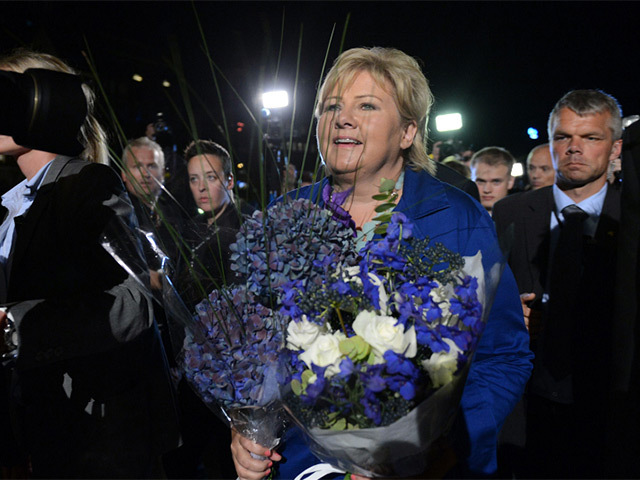
Norway’s new leader Erna Solberg has vowed to limit spending of the nation’s $750billion oil fund after a jump in inflation triggered the biggest surge in the krone in two months.
Solberg, who ousted Labor Prime Minister Jens Stoltenberg in elections this week after promising tax cuts, said she would keep within a 4% percent spending rule of Norway’s oil fund amid concern Scandinavia’s richest economy is overheating.
Her government, which she has yet to form, is likely to keep spending closer to 3 percent, she said.
“We’ll always make sure that we don’t exceed the limits of our capacity in the economy when it comes to the impact of demand from the fiscal side of the budget,” Solberg said.
“But if there’s an international crisis or economic slowdown, of course we increase the amount of money we are using.”
The rule, introduced last decade under Labor, is one of the main sticking points dividing the four-party coalition that won the election on Monday. The Conservatives, Liberals and the Christian Democrats all support keeping the rule while the Progress Party has campaigned on scrapping limits to allow more investment in infrastructure.
READ MORE:
Norway’s oil wealth to feature heavily in talks to form coalition government
The dispute has triggered concern among economists over what policies the new government may deploy – and its impact on the krone. A new report showed core inflation jumped last month to a four-year high of 2.5%, sparking the krone’s rise against the Euro.
While the 4 percent rule was designed to limit government spending, its effect has been partly undermined by growth in the size of the oil fund. With the fund quadrupling in size since 2005, even sticking to the rule results in faster public spending growth.
The government estimated in its revised budget this year that the spending room will grow 18 percent next year to 180 billion kroner ($30.3 billion). Stoltenberg’s outgoing coalition plans to spend 3.3 percent of the fund this year, or 125 billion kroner.
The Progress Party is also scaling back its talk of exceeding the 4 percent rule as it seeks to become part of a government coalition for the first time since the group started as an anti-tax movement in 1973.
“We don’t need to change the rule to be able to spend more money,” said Progress Party financial spokesman Ketil Solvik-Olsen. “There’s a lot of room to maneuver within today’s spending rule.
“What drives us primarily is that we believe the money is being spent in the wrong way,” Solvik-Olsen said. “We need to make room to speed up public investments without having to cut public spending beforehand.”
Norway’s mainland economy, which excludes oil and gas output, will grow 2 percent next year, unchanged from this year. That will beat the 0.7 percent estimate for the euro area, according to DNB ASA forecasts.
Recommended for you
